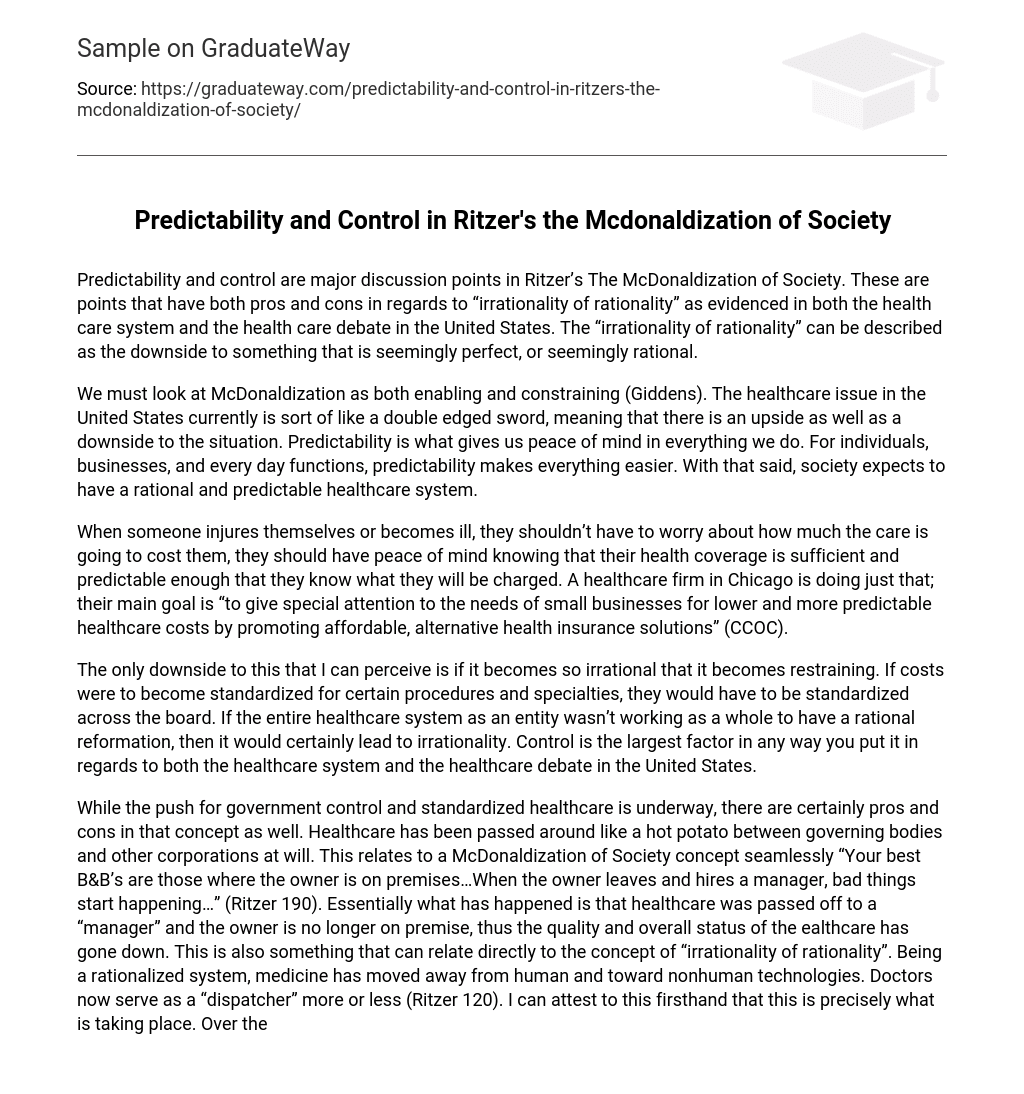Ritzer’s The McDonaldization of Society emphasizes the importance of predictability and control. These aspects have advantages and disadvantages, which can be seen in the healthcare system and the ongoing health care debate in the United States. The concept of the “irrationality of rationality” denotes the downside of something that appears flawlessly logical or perfect.
According to Giddens, we need to consider McDonaldization as both empowering and limiting. The current healthcare problem in the United States is like a two-sided blade, implying that there are advantages and disadvantages to the situation. Predictability provides a sense of security in all aspects of life. Whether it is for individuals, businesses, or daily activities, predictability simplifies everything. Consequently, society demands a rational and foreseeable healthcare system.
Chicago-based healthcare firm, CCOC, aims to provide peace of mind to individuals who suffer from injuries or illnesses by offering sufficient and transparent health coverage. Their objective entails addressing the specific needs of small businesses, ensuring lower and more predictable healthcare costs through affordable alternative insurance solutions.
A possible downside that I foresee is the potential for irrationality to become excessively restrictive. If there were a universal adoption of standardized costs for particular medical procedures and specialties, the failure of the entire healthcare system to effectively work together on a logical reform will undoubtedly lead to irrationality. Control plays a crucial role in both the healthcare system and the healthcare debate in the United States, regardless of differing viewpoints.
Government control and standardized healthcare have both advantages and disadvantages. The transfer of healthcare from governing bodies to corporations is comparable to the McDonaldization of Society, as explained by Ritzer (190). According to him, when the owner of a B&B departs and hires a manager, the quality declines. Similarly, healthcare has been handed over to a “manager” without the owner’s presence, resulting in a decrease in quality. This also aligns with the concept of the “irrationality of rationality”. Medicine now focuses more on nonhuman technologies rather than human involvement, with doctors primarily functioning as dispatchers (Ritzer 120). From my personal experience, I can confirm that this trend is indeed occurring. After undergoing surgery six months ago, I have started experiencing unexplained seizures.
After the initial episode, I was hospitalized and underwent multiple tests but no medical cause could be found. I was then discharged. When the second episode occurred, I sought help from my primary doctor but received no assistance. Following Ritzer’s description, I was referred to different specialists like a neurologist, cardiologist, and gastronologist, but none of them could offer any explanations. After experiencing another occurrence, I went back to my primary doctor who recommended undergoing the same procedure again.
My primary care doctor no longer serves as my doctor unless I require a physical or a routine visit. I am often referred to specialists, which I wouldn’t mind if they were able to effectively assist me and if there wasn’t a constant stream of patients being referred to them by their doctors. This is definitely a downside to the control system. In a way, this type of control allows doctors to remain the primary diagnosticians, directing their patients to specialized doctors for treatment they deem necessary. Another form of control is the influence of technology on physicians through “pathways”.
These pathways function as a type of sequential procedure, similar to computer diagnostic and automotive diagnostics. Utilizing a series of questions, each leading to different paths based on the answer to the previous question, these pathways aim to yield a final accurate answer. This facilitates the provision of effective and efficient care to patients from their healthcare provider. Despite the rationalization of medicine through this approach, it has its drawbacks. The doctor’s role of asking a series of questions and determining a prognosis could be replicated by a machine.
The lack of personal care in the healthcare system is emphasized, resulting in decreased communication between doctors and patients. Instead of merely going through a checklist of questions and symptoms, the author contends that when individuals visit a doctor, they desire their symptoms to be heard and their medical expertise used for diagnosis. The United States healthcare system is regarded as an utter catastrophe, with no apparent progress being made in the ongoing healthcare debate. The government’s aspirations for predictability and control in healthcare are deemed unattainable.
The balance between rationality and irrationality in both the healthcare system and the healthcare debate is something that will take time and hopefully happens in the near future. For being the “greatest country in the world” we certainly know how to take care of our own, don’t we?
Works Cited: Giddens, Anthony. The Constitution of Society. Berkeley: University of California Press. 1984. “HEALTHCARE & WELLNESS COMMITTEE”. Chicagoland Chamber of Commerce. 21 March 2010. Ritzer, George. The McDonaldization of Society. Los Angeles: Pine Forge Press, 2008.





